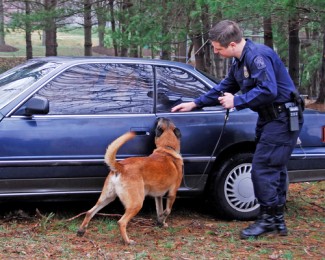Was chief justice's vote in dog-sniff case due to 'Ferguson effect'?

Image from Shutterstock.
A U.S. Supreme Court ruling on Tuesday favoring motorists in some dog-sniff cases had an unusual lineup.
Justice Ruth Bader Ginsburg was joined by three of the court’s liberals in her majority opinion, along with Justice Antonin Scalia, who has previously joined with liberals in some Fourth Amendment cases, and Chief Justice John G. Roberts Jr.
An article in Slate offers a possible reason for Roberts’ vote: the “Ferguson effect.” Slate writer Mark Joseph Stern wrote, “Perhaps the savvy, media-aware Roberts has finally learned the lessons of Ferguson and is trading in his logical abstractions for some much-needed legal realism.”
Ginsburg’s opinion gave motorist Dennys Rodriguez a chance to pursue his argument that police violated his Fourth Amendment rights when he was pulled over for driving on a highway shoulder, issued a warning, and forced to wait seven or eight minutes for a search by a drug-sniffing dog. The dog alerted, Rodriguez’s car was searched, and a large bag of methamphetamine was found.
The Supreme Court previously found no constitutional violation when a dog sniff is made during a lawful traffic stop. But when a police stop exceeds the time needed to handle a traffic violation, police must have a reasonable suspicion to justify the extra time to avoid violating Constitution’s shield against unreasonable seizures, Ginsburg said in Rodriguez v. United States.
During oral arguments in the case, Roberts appeared to assert, perhaps jokingly, that police have never pulled him over. “Usually, people have told me, when you’re stopped, the officer says, ‘License and registration,’ ” Roberts said, according to this prior Slate story.
There was laughter in the courtroom, spurring recently retired public defender Shannon O’Connor to respond, “I’ve had friends that say the same thing, Mr. Chief Justice.”
Stern calls the Rodriguez case “the term’s second big criminal-law decision.” In the first, Roberts wrote the opinion for an eight-justice majority that found a reasonable mistake of law can give rise to the reasonable suspicion necessary to justify a traffic stop. The officer in that case, Heien v. North Carolina, mistakenly believed North Carolina law required both brake lights to be working when he stopped a vehicle with just one working brake light. Justice Sonia Sotomayor was the only dissenter.
According to Stern, “Heien raised the question—especially pertinent in light of the Ferguson debacle—of whether the justices really get the volatile, nerve-wracking nature of police encounters, the dramatic power imbalance that allows cops to trample on citizens’ rights. In Rodriguez, the court provides the answer: Sort of.”
Hat tip to How Appealing.



